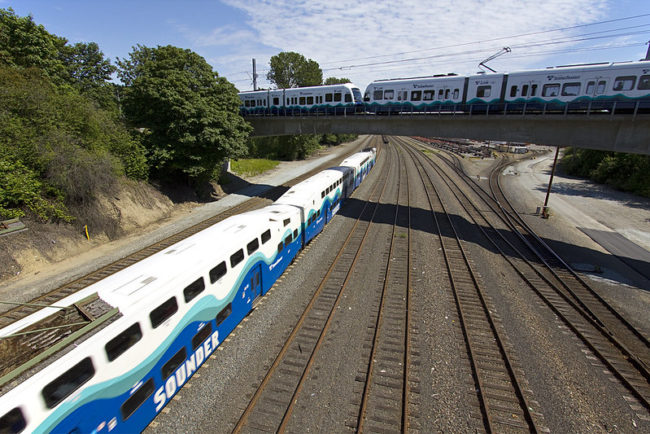Liias bill would reset MVET valuations
 Link and Sounder trains (image: AtomicTaco/flickr)
Link and Sounder trains (image: AtomicTaco/flickr)Senate Bill 6606, introduced last week by Senator Marko Liias, is the latest effort in the Legislature to resolve the three years old controversy over the MVET valuation schedule. The bill would potentially reduce Sound Transit tax revenues by just over $1 billion over the next 20 years.
The MVET valuation schedule has been a political challenge for Sound Transit and the Legislature since the first higher car tab bills began arriving in mailboxes in early 2017. Sound Transit has levied a 0.3% MVET since 1996, and added another 0.8% MVET with ST3 in 2016. The latter heightened awareness that Sound Transit was using a valuation schedule from 1999 that assigned relatively high values to newer cars. An alternative schedule which the Legislature approved in 2005 will not take effect for Sound Transit taxpayers until 2028. That is the year when the original 0.3% MVET expires after bonds are paid off, and the remaining 0.8% MVET is reset to the newer, generally lower, schedule.
Many car owners, particularly of course those who never liked the MVET, rebelled against what they saw as an unfair tax. There have been bills in the Legislature to address this in 2017, 2018, and 2019, none of which passed. In November 2019, statewide voters repealed all of Sound Transit's MVET authority, but that initiative is the subject of ongoing litigation and is currently enjoined from taking effect with uncertain long-term prospects. I-976 failed 46-54 within the Sound Transit area. It passed by large margins in Pierce, Snohomish, and South King County, but failed by even larger margins in Seattle.
Sound Transit last month reiterated that they would "work collaboratively with the State Legislature to address concerns related to Motor Vehicle Excise Taxes while preserving the agency's ability to fully deliver the voter-approved plan within the adopted timeline". In other words, fix the valuation problems, but make Sound Transit whole on the foregone revenues.
The Liias bill repeals I-976 in the event that the courts allow it to go into effect. It then reforms the schedule for MVET taxes going forward. In doing so, it goes somewhat further than previous bills. The lower schedule applies to both the 0.3% MVET from 1996 and the 0.8% MVET approved in 2016. It also adjusts the levels for older cars so that nobody would pay more than currently. (The 2005 schedule is generally lower than the 1999 schedule, but is higher for cars older than eleven years. The bill protects those car owners against a tax increase).
Sound Transit estimates the revenue reduction at $1.024 billion through 2041, higher than the $700-$800 million cost in earlier bills because of those added elements. So far, the bill does not identify any offsets, though Liias has indicated he is looking into offsets.
Sound Transit further estimates an additional reduction of $1.887 billion after factoring in borrowing. That's the accounting cost of the debt servicing through 2041 if they make up all of the tax revenue reduction through borrowing. That number shouldn't be taken too seriously. As Sound Transit borrows, it then incurs more debt to make the principal and interest payments on the first, then yet more to service that debt. The nominal accounting is correct, but overstates the rather smaller economic impact. The calculation also assumes conservatively high interest rates.
Much more consequential than the nominal accounting of debt service costs is whether this pushes Sound Transit past statutory debt limits. That's the point at which projects would be delayed (and you should care more about delays than rolled-over debt expenses). On current long term projections, it's a close call whether the loss of $1 billion in tax revenues would delay projects. Legislators will not know whether they are voting to delay projects when they vote on this bill because the critical "pinch point" in agency finances in the late 2020s and early 2030s.
In the event that Sound Transit is fully constrained by the statutory limit, the $1 billion revenue loss should be seen in the context of a 2020 capital budget of $2.5 billion. Factor in that ongoing projects would proceed unaffected, and the worst case scenario is about a six month delay on future projects. If you think suburban politicians will be relaxed about that, however, look no further than 130th St station. There a debate is ongoing about a debt impact of just tens of millions on future projects.
Prospects for the bill are rather uncertain. The repeal of I-976 provisions require a 2/3rds majority. At this time no corresponding bill has been filed in the House. The 14 sponsors are all Democrats from mostly suburban cities, and the bill will require both Seattle Democrats and Republicans to pass.